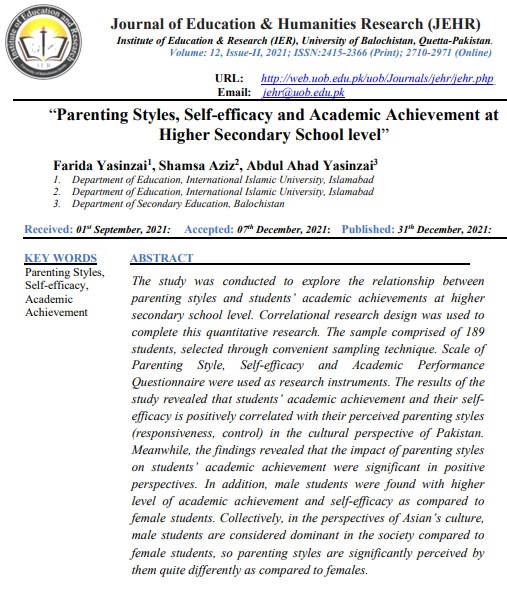Parenting Styles, Self-efficacy and Academic Achievement of Higher Secondary School Students
Keywords:
Parenting Styles, Self-efficacy, Academic AchievementAbstract
The study was conducted to explore the relationship between parenting styles and students’ academic achievement at higher secondary school level. Correlational research design was used to complete this quantitative research. Sample was comprised on 189 students, selected through convenient sampling technique. Scale of Parenting Style, Academic Self-efficacy and Academic Performance Questionnaire were used as research instruments. Results of the study revealed that students’ academic achievement and their self-efficacy is positively correlated with their perceived parenting styles (responsiveness, control) in the cultural perspective of Pakistan.
Meanwhile, the findings reveal that impact of parenting styles on students’ academic achievement is significant in positive perspective. In addition, male students were found with higher level of academic achievement and self-efficacy as compared to female students. Collectively, in the perspectives of Asian’ culture male students are considered as the dominant part in the society than female so, parenting styles are significantly perceived by them quite different as compared to female.
Keywords: Parenting Styles, Self-efficacy, Academic Achievement.
References
Becker, K. D., Ginsburg, G. S., Domingues, J., &Tein, J. Y. (2010). Maternal control behavior and locus of control: Examining mechanisms in the relation between maternal anxiety disorders and anxiety symptomatology in children. Journal of abnormal child psychology.
Blaze, P. (2019). The Effects of Social Support and Self-Efficacy on Academic Performance (Doctoral dissertation).
Cherry, K. (2016). Erik Erikson’s stages of psychosocial development the eight stages of psychosocial development. Verywell.com, Psychology.
Darling-Hammond, L., & Snyder, J. (2015). Meaningful learning in a new paradigm for educational accountability: An introduction. education policy analysis archives.
Honicke, T., & Broadbent, J. (2016). The influence of academic self-efficacy on academic performance: A systematic review. Educational Research Review, 17, 63-84.
Honicke, T., & Broadbent, J. (2016). The influence of academic self-efficacy on academic performance: A systematic review. Educational Research Review, 17, 63-84.
Johnson, E. J., & Descartes, C. H. (2017). Parental influence on academic achievement among the primary school students in Trinidad. Early Child Development and Care, 187(7), 1221-1227.
Johnson, L., Radesky, J., & Zuckerman, B. (2013). Cross-cultural parenting: Reflections on autonomy and interdependence. Pediatrics, 131(4), 631-633.
Kalenkoski, C. M., & Pabilonia, S. W. (2017). Does high school homework increase academic achievement? Education Economics, 25(1), 45-59.
Knappe, S., Beesdo-Baum, K., &Wittchen, H. U. (2010). Familial risk factors in social anxiety disorder: calling for a family-oriented approach for targeted prevention and early intervention. European child & adolescent psychiatry, 19(12), 857-871.
Masud, H., Ahmad, M. S., Jan, F. A., & Jamil, A. (2016). Relationship between parenting styles and academic performance of adolescents: mediating role of self-efficacy. Asia Pacific Education Review, 17(1), 121-131.
Stavrulaki, E., Li, M., & Gupta, J. (2020). Perceived parenting styles, academic achievement, and life satisfaction of college students: the mediating role of motivation orientation. European Journal of Psychology of Education, 1-25.
Teye, A. C., &Peaslee, L. (2015, December). Measuring educational outcomes for at-risk children and youth: Issues with the validity of self-reported data. In Child & Youth Care Forum (Vol. 44, No. 6, pp. 853-873). Springer US.
Wang, M., Deng, X., & Du, X. (2018). Harsh parenting and academic achievement in Chinese adolescents: Potential mediating roles of effortful control and classroom engagement. Journal of school psychology, 67, 16-30.
Wolters, C. A., &Hussain, M. (2015). Investigating grit and its relations with college students’ self-regulated learning and academic achievement. Metacognition and Learning, 10(3), 293-311
Zimmerman, B. J. (2000). Self-efficacy: An essential motive to learn. Contemporary educational psychology, 25(1), 82-91.




